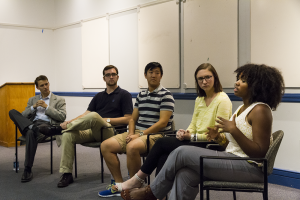
Evan Hollander (SFS ’14), Nate Tisa (SFS ’14), Kyle Zhu (SFS ’14), Lizzy MacGill (COL ’14) and Aya Waller-Bey (COL ’14) talk at “Georgetown in FIve Years: A Conversation With Student Leaders.”
Student leaders shared their visions for the future of the university at “Georgetown in Five Years: A Conversation with Student Leaders” on Tuesday.
The event, sponsored by The Hoya, was moderated by Evan Hollander (SFS ’14), chair of The Hoya’s board of directors. The panelists acknowledged the work the administration has done to include students in planning the future of Georgetown, but said that there were still challenges ahead.
“The [2010 Campus Plan], I think, has been challenging for everyone to deal with — students, administration and the surrounding community as well,” Georgetown University Student Association President Nate Tisa (SFS ’14) said. “I think in five years, we’re going to be in a much better position than we are now.”
Students of Georgetown Inc. Chief Executive Officer Lizzy MacGill (COL ’14) said that when The Corp was building the Classy pre-registration website, there were occasional disagreements between students and the administration.
“It’s a good example of how there’s this conflict between The Corp’s mission, which has always been kind of ‘no adults allowed,’ and things the university can’t release,” MacGill said.
Students of Color Alliance Co-Chair Aya Waller-Bey (COL ’14) added that the bureaucratic nature of the administration hinders student group operations.
“We wanted to bring an outside speaker to campus, and it took about three months,” Waller-Bey said, noting that the speaker ended up not coming. “Just having opportunities to have speakers I find extremely difficult because of the processes and the difficulties and the bureaucracies of it all.”
The panelists did agree that students could do more overall to make the university aware of concerns.
“I think that in five years, when we really look forward, I think we can do a lot more as a student body,” School of Foreign Service Academic Council President Kyle Zhu (SFS ’14) said. “We Georgetown students are ambitious and we want to run things.”
Tisa concurred, citing the importance of recognizing student initiative.
“The more we can convince the university that we’re people who should be treated not like minors, but like adults … the better off we’ll be,” Tisa said.
MacGill pointed to an evolution in the student-administration responsibility balance.
“The university has done more to include students along the way,” MacGill said.
The student panelists agreed and said that they want to engage a wider population of students in improving life at the university.
“One thing I do want to stress the importance of is that students who aren’t the same visible leaders in the community get involved,” Waller-Bey said. “I think it’s also important … that we have a diverse amount of opinions contributing to the conversation.”
Tisa stressed the need for creating impetuses to amplify student engagement.
“We need projects that will get the conversation away from these people up here and to the people who are sitting in their dorm rooms right now and not going to events,” Tisa said.
Waller-Bey said the university should work harder to embrace diversity, possibly through academics.
“I think that’s one of my biggest disappointments about Georgetown is this lack of consistency,” she said. “We say diversity and we say we want to recruit a diverse group of students, and we have these conversations, but after NSO they just die.”
The panel finished its discussion by offering advice for younger students on how to make a difference during their time at Georgetown.
“Advice I wish I’d heard is start slowly, with something you’re sure you’ll like and build relationships with older students who are involved with those groups,” MacGill said.
Zhu cautioned selectivity.
“Don’t do too much at once. Don’t do what I did, which is sign up for five clubs, and burn out,” Zhu said. “Find what your passion is.”














